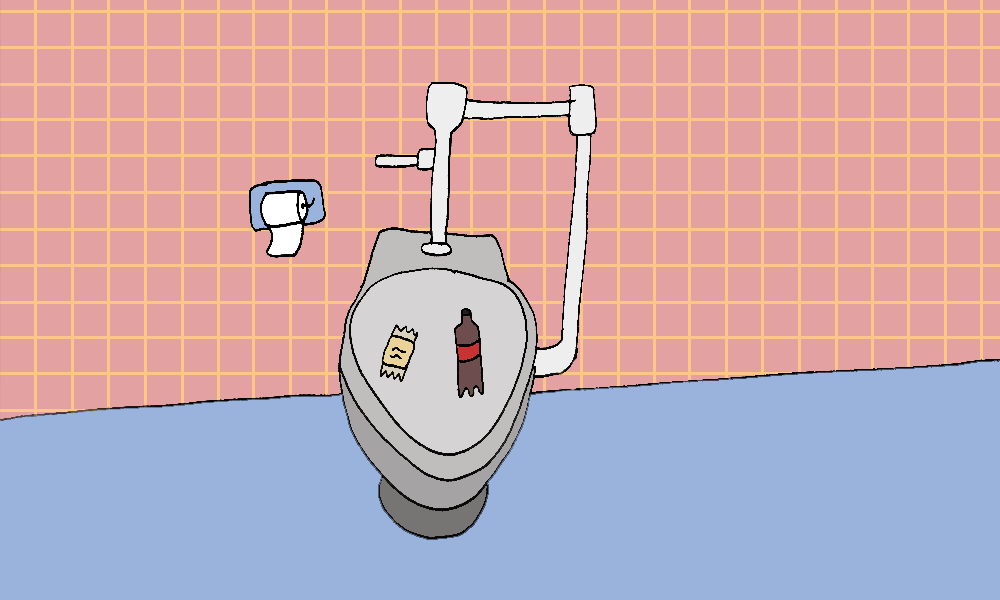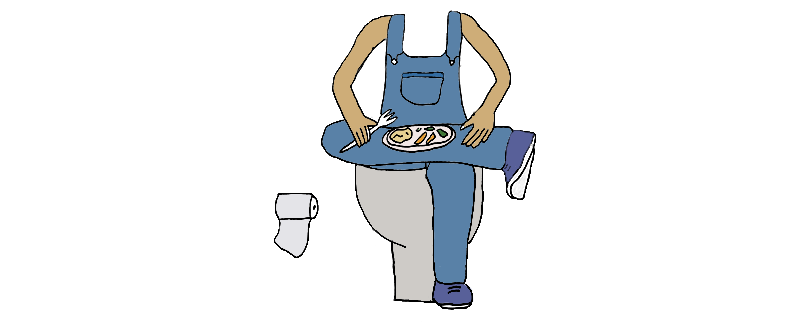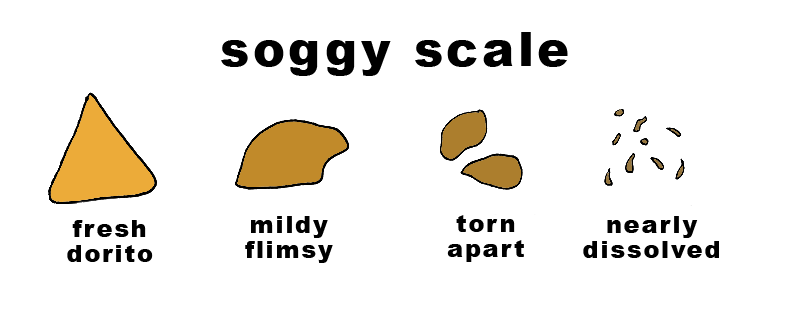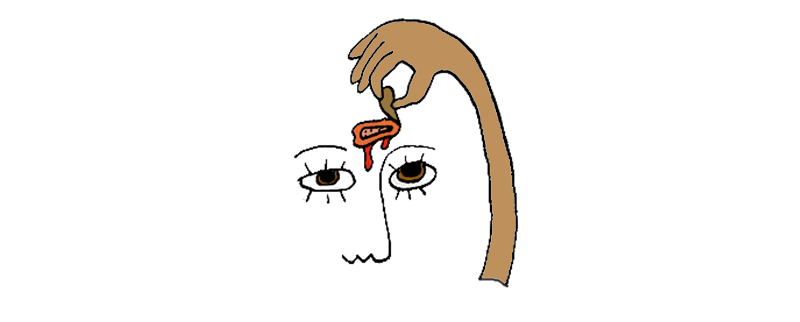I learned a lot hanging out in bathroom stalls. Like how many girls came in there to cry. Or that some girls came in there while experimenting with double dongs.
For me, the bathroom was a place to hide: the only actual place in high school where I could disappear. It wasn’t enough to slink into the back row of class, buried in a book, hoping the teacher didn’t realize I was writing stories instead of taking notes. Unfortunately, my test scores gave away that I was studying, if not paying attention. Anytime a lull hung over the classroom, inevitably my name was called upon: “Allison, do you know?” All eyes on me. Did my peers think about the constellations that acne formed on my face? Recognize me as the girl who had no table in the lunch room? My stomach churned. I’d meekly mutter a response, then skip the next period to linger in the bathroom. Getting good grades helped; oddly, I was never reprimanded for ditching class.
I didn’t start off my secondary education this way, watching the minutes tick by on my Minnie Mouse watch while others peed, impressed by those who could be in and out in under a minute, disgusted by the number of girls who didn’t wash their hands. In fact, I was excited for the first day of high school, and not because of bathrooms. Bloomingdale was the only public high school zoned for my hometown of Valrico, Florida. This meant that the friends I grew up with riding bikes through hot, humid summers and held sleepovers on trampolines with were all together. Sure, we were probably the only table of girls in eighth grade who played spelling games at lunch, but we had each other.
However, by the time I started my senior year, I was entering my fourth high school. Since Bloomingdale, my father’s job took us overseas and back, into the Midwest, and finally to the Pacific Northwest where I eventually graduated. Though I had been a loud-mouthed kid (constantly teasing my friends’ older brothers, demanding my friends spend slumber parties playing school with me as the teacher), somewhere in my adolescence, I became painfully shy. My body blossomed alongside my love for Twinkies. I developed size 34 triple D boobs: things I was just not confident enough to work with. Meanwhile, my passion for Doritos didn’t help my double chin nor the acne that exploded all over my face in cluster-filled rows and, after years of my mother insisting I wear my naturally curly hair in an afro, I rebelled by pulling my frizzy hair back as tightly as possible into a low bun, fully exposing my round, pimply face.
Also, I still wore braces, as each time we moved, the new orthodontist would shake their head at the work done before them. These physical attributes were paired with the fact that my parents’ budget could only afford a trip to Goodwill once a year for new clothes, where my lack of fashion sense as well as insecurity with my body found me choosing to wear oversized overalls topped by baggy sweatshirts, creating the illusion of a floating waist. This earned me the title of “The fat one” amongst my siblings and dad. My sister was titled “The pretty one.”
Also, I was weird. In elementary school, I spent my days imagining that I was actually Laura Ingalls Wilder, my mother’s periwinkle minivan a horse-covered wagon, my frizzy afro hidden beneath an imaginary bonnet. In junior high, if my friends weren’t around during long holidays, I unashamedly pulled the Barbies out from the closet and used them to orchestrate entire plots that I later sat at my desk writing until my dad yelled at me to go to bed. I knew I wasn’t a part of the Jennifer, Jennifer, and Charity crowd who did little league cheerleading and received chocolates and balloons on Valentine’s Day. But could they create an original musical around Aqua’s Barbie Girl album? Likely not. Content in my weirdness, I was grateful to have friends who understood me and who appreciated the weekly vocabulary words as an ongoing challenge, my best friend and I forever attempting to one up each other with creative sentences in an effort to see who could most impress our teacher.
Abruptly moving overseas at age 14 changed all that. I was too caught up in anger and resentment toward my parents for altering my world to think about introducing myself to my peers. I preferred to write letters to my friends back home. My friends in Florida got me, weirdness and all; what if these new kids just made fun of me? What if they thought my Barbie plot creations just meant I still played with Barbies? It was easier to sit quietly in the background than to bring unwanted attention to myself.
By the time I finally found a niche within the drama department (a popular collection place for weirdos), my father’s company transferred us to the Midwest. When we moved a third time the summer before my senior year, I lost the energy to bother with friendships: now it was all about survival.
At 17 years old, my chest tightened against my shallow breathing on the first day of school as I asked strange teachers in the hall where I could find my German class, a recognition that the only other confused faces seemed to be asking about Freshman English. My cheeks flushed and I had to blink several times to keep my eyes from tearing up as I tried to orientate myself in the foreign hallways. Not only was I starting my last year of high school friendless, but I was lost. Also, my schedule unfortunately indicated that German was to be followed by Washington State History: a graduation requirement that I was lacking due to never having lived in the state before.
“Mostly freshmen and sophomores take that class to get it out of the way,” the principal informed me when I registered with the school, “but I’m sure you won’t be the only senior in there. Lots of kids put that class off.”
In fact, I was the only senior in there. There, I grew a new loathing for group work, trying to manage nose-picking 14-year-olds who wanted to talk about their farts rather than collaborate on dioramas tracking the Washington state founders’ journey over. It was then that I began to consider spending class time in the bathroom.
Naturally introverted, bathrooms began to appeal to me for whole school events as well. After spending one pep rally feeling dizzy as my heart fluttered in knowing I had no group to sit with (convinced I stood out as the clear loner in the senior section), after realizing most seniors and juniors left campus for lunch in cars I didn’t own and wasn’t invited to squeeze into (forehead down, toes squeezing up and down inside my sneakers as I attempted to eat my chicken fingers at the end of a long table full of laughing freshmen whom I recognized from Washington State History), I decided that my food’s exposure to toilet germs and the ambiance of tampon filled waste bins was far more appealing than the agony of having one more teacher come up to me in the cafeteria asking how I was adjusting to Richland High School. I wasn’t.
At my mother’s request, I attempted to find community in my alma mater’s Theatre Arts program, but I didn’t even make callbacks to help backstage. Turns out, Santino Fontana was the golden boy of this school’s stage. When the future Hans of Disney’s Frozen stars in every musical, drama no longer is a breeding ground for outcasts and weirdos and, instead, takes on the competitive nature of Hollywood. My acne, overalls, and floaty waist never stood a chance.
Not only was I shy and hated my body, but I was convinced I must also be disgusting. At two separate high schools (while minding my own business at my locker) a group of boys called out to me, “Hey! Hey you, girl! My friend wants to ask you out.” And both times (before I could even process what they were saying to me), the groups burst out into laughter, squealed, “Yeah right!” and ran away. These occurrences happened on separate continents. Clearly the issue was me. After all, the only dance I was ever asked to in high school was by an overweight underclassman who wore long greasy hair over his own acne and who played clarinet in the school band. If this was where I fit in during high school, I wanted out. But out meant graduating. So I needed to find a way to slink into the background until then.
And thus began my time hanging out in bathrooms. It wasn’t completely abnormal. Other students came into the girls’ room to gossip with their friends for lengths of time. I did no different. It was a great opportunity for me to check in on my Tamagotchi pet and make sure I cleaned up all of his electronic duck poop before he got sick and died and I had to start all over at the egg stage again. For all the time I spent on the toilet, I might as well have been wiping up shit (even if it wasn’t my own) and I could pride myself in being a good parent: a double win. I began spending lunch, pep rallies, and the occasional Washington State History class there, varying which bathroom I chose in case anyone began to recognize my multi-colored pastel Converse shoes peeping out from the stall.
Entering the bathroom, I always breathed a sigh of relief if no one else was in there, then quickly ducked into the stall furthest away from the entry door. I’d hang my backpack on the door hook, wipe off the seat with toilet paper, then sit down fully clothed, hoping that no lingering excrements attached to my jeans. Sometimes I brought a book. If it was lunch time, I ate my food, careful to hold off on chips when other students came into the bathroom while I was hiding. Occasionally, girls would enter moments after I stuffed my mouth with Doritos and, not wanting to draw attention to myself by crunching and munching, I’d hold the crisps in my still mouth sucking upon their flavor as they dampened, hoping not to sneeze as my nostrils tingled with garlic powder. If the girls stayed to chat or apply lipstick long enough, the chips sometimes dissolved in my mouth on their own, allowing a smooth swallow down.
Study hall period meant I could hide in the library, a much more sanitary place to kill time. However, a boy in my grade began hovering over me, as he too had that hour free. I tried ignoring him while searching encyclopedias for information to write my history essays, nodding periodically as he rambled on about how all he wanted to do was join the army but couldn’t because his arms popped out of their sockets. One time, I missed my library study hall time to go to an orthodontist appointment. The next day, socket boy asked why I wasn’t there. Then, he mentioned how he liked guns. Only a year had passed since the Columbine school shooting; “If you see something, say something” would not become a motto for several years. All I wanted was to get my diploma and be done with this whole hell without drawing attention to myself, including from guys who talked about guns. When it came to fight or flight, I was flight all the way, even at the expense of the student body. I began spending study hall in the bathroom as well. Years later, when I heard interviewees refer to neighbors gone postal as “always a quiet man,” I wondered how many of those quiet men were rejected from the army because of their arm sockets.
There was a strategy to my hiding. I couldn’t exactly skip Washington State History every day. Once a week also seemed too much: the teacher would suspect something or, worse, worry about me. Ask if I was okay. This too would be unwelcome attention. Since I could hide during every lunch and study hall without question, I determined it best to hide only when history class required group work. Fart boys would never miss me. And even though my teacher turned his gaze to me in the hall one afternoon after I skipped his class, and even though his eyes narrowed in on me with a pensive expression, he never once mentioned it. When my report card reflected “A,” I decided it was safe to skip not only group work, but once every other week as well.
While others peed, I tried to be as convincing as possible. Who wanted to be discovered as the person hiding in the bathroom? Choosing the stall furthest away from the door allowed me time to stand up and take off my pants should another student enter. I figured overalls around my ankles appeared less suspicious, even if I wasn’t really relieving myself. I then waited while the other person took care of her business, interjecting any silence to pull wildly at the toilet paper roll so as to indicate my usage of it. No one ever questioned me, never asked if I was okay in there. Not once did a teacher come in to find me. Though I would never come close to being cast as Frozen’s Anna, I was proud to give my toilet performance an A+ rating, if not an Academy Award.
Though it was an ideal hiding spot, the bathroom was a lonely place. Secure within my stall, I’d often zero in on the dripping of sinks, of pipes, each water droplet echoing the moments of my solitude. Every conversation that floated through gossiping about various parties, couples, scandals, or general frustrations over teachers and test scores was a solid reminder that I had no one to vent to, to share life with. I sat slinking behind stall doors hoping no one realized how long I was actually sitting there, fully aware of everyone else around me as I prayed to God that they were all oblivious to me.
Fortunately though, most days were quiet. While I hid during pep rallies, lunch, study hall, or Washington State History, I was mostly bored, passing the time by picking at my acne, scolding myself if I opened up scabs or caused my face to bleed. I traced my fingers along the various zitty constellations, determining if it was the Big or Little Dipper on my left cheek, Orion, or a snowman on my chin. Then, I spit on a piece of toilet paper and used the damp wad to hopefully wipe off any blood that may have streaked across my face. Returning home each afternoon was always a discovery in what further damage I had caused my face.
But there was that one time when my solitude was suddenly broken by two whispering, giggling girls who shuffled into a stall two doors down from me and, as I heard the usual sounds of unzipping, was suddenly struck by the very unusual sounds of moaning, laughing, and an instructional voice that kept saying, “Like that, ride it like that.” As a virgin wearing my “What Would Jesus Do” bracelet, I sat in awkward confusion knowing I was privy to something private but unsure what exactly it was. As the moaning increased, I realized I had stayed too long to suddenly run out into the hallway. I held my feet up and prayed they would leave before they knew I was in there. After all, riding them out seemed safer than running into socket boy in the library. It wouldn’t be until conversations in college that I realized they were riding a double dong next to me.
In May 2000, I finally got my wish: I graduated from high school. As it turned out, it was the hardest day of my high school career. I couldn’t walk the stage hidden in the bathroom, and this time, my family and visiting relatives were all there to see that I had no one to hug when the commencement ended. I had gotten out of high school exactly what I wanted: invisibility. But on graduation day, my role as a loner was fully exposed.
“Aww, she’s crying,” my mother said as she attempted to pose me for photos against the backdrop of the football stadium.
“We’re very proud of you,” my father said, patting my shoulder. As it was the first time I recalled him ever saying this to me, I allowed him to believe my tears were based on the achievement of the evening and not because I wanted to run away from this field as fast as Forrest Gump had his.
As my peers stormed the football field (throwing their caps into the air and posing for group shots in their shiny gold gowns), my chest began to tighten against my breathing the way it had at pep rallies when I had no one to sit with. I looked back and forth between my mother’s eager camera and the groups of seniors I had no belonging to. I began to feel flushed as hot tears pooled down my cheeks, my finger nails digging into my cuticles, when my aunt gently stood beside me and said, “It’s been a long day. Maybe it’s time to get Allison something to eat?”
Though I didn’t ask, part of me wondered how she knew. Had she spent her high school years similarly, hiding away in bathroom stalls? Or perhaps she represented something else, that some of those gossiping girls were paying attention to the loner hiding inside of her stall after all. Perhaps I was as expected a part of the toilet facilities as the sinks: a constant reminder that some of us just wanted to disappear until graduation while others peed. •
All illustrations by Isabella Akhtarshenas.








